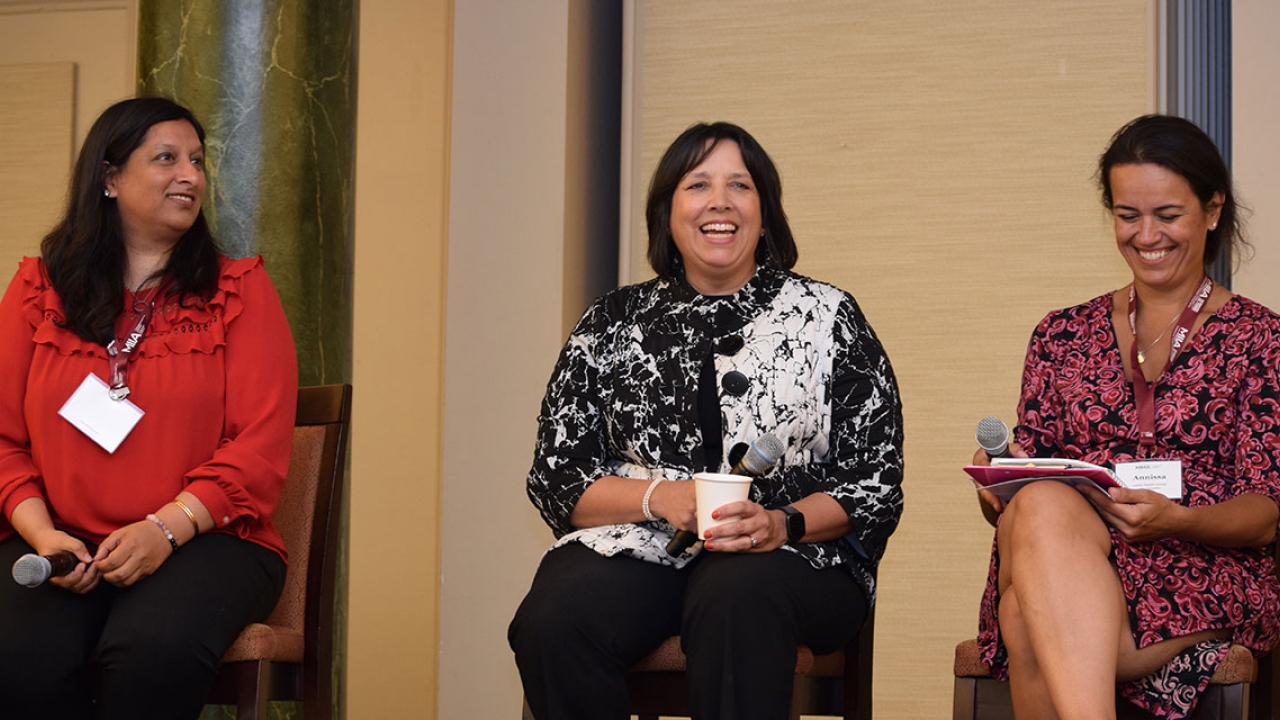Wellesley Hosts Inaugural Conference for Women Who Are Municipal Officials in Massachusetts

On July 20, Wellesley hosted the first Women Elected Municipal Officials Leadership Conference, put on by the Massachusetts Municipal Association, which brought over 50 elected officials to campus for a half-day of speeches, panels, and discussions. Topics ranged from coalition building, to opportunities for collaboration, to handling the unique challenges that come with being a woman elected official.
President Paula A. Johnson was the conference’s keynote speaker. “Simply by running for office, you sent a message about what leadership looks like, and every day you serve, that message is further amplified,” she said in her remarks to the group, which included mayors, select board members, planning board members, and city councilors from across the commonwealth. “What we see shapes our sense of what is possible. Your accomplishments light the way for girls and other women.”
Women hold about a quarter of state and municipal elected positions across Massachusetts (among them are Julie Flowers ’01, Megan English Braga ’99, Marianne Brons Cooley ’81, and Lea Anderson ’73). The conference gave some of them a chance to come together to develop relationships and discuss issues that cut across towns, cities, and levels of government.
“As local elected officials, we get really invested in our towns,” said Mehreen Butt, the first Muslim-American woman to be elected to the position of selectman in Massachusetts and a member of the steering committee that developed the event. “You know everyone locally, but we don’t necessarily look to see what other towns are doing, how we can learn and work with other towns, so we wanted to have this conference. We were excited to have it at Wellesley College, because it so aligned with what Wellesley does. That was clear in Dr. Johnson’s speech.”
“This was an opportunity for collaboration not just around the work, but also to build relationships and mentorship,” said Annissa Essaibi-George, an at-large Boston City councilor who sat on a panel about creating alliances and building coalitions. “Because we still don’t occupy enough elected seats to see women in every setting, partnering is critical and cross-sector work is important. The best way to be successful is to build relationships. This was a first step for many of us to be in the same room together, to spend time with each other and develop relationships. With that, the work comes so much easier.”
“When you’re elected, there is no handbook for what the job entails,” said Butt, who hopes the Massachusetts Municipal Association will continue to host similar gatherings across the commonwealth. “There is no ‘how-to.’ This conference is a resource that can help fill that in. You get to meet folks who are doing the same thing. It helps to realize that none of our problems are unique.”
“I left inspired and moved and reenergized,” Essaibi-George said. “Conferences like this—you need those opportunities to reflect on the work, to think differently about your work as an elected official, and a woman elected official. We are certainly not all cut from the same mold, we don’t focus on the same issues, but we share many similar struggles. For me this was very powerful.”
Photo: L to R Mehreen Butt (Town Councilor, Wakefield, Mass.), Kimberly Driscoll (Mayor, Salem, Mass.), Annissa Essaibi George (City Councilor, Boston)



